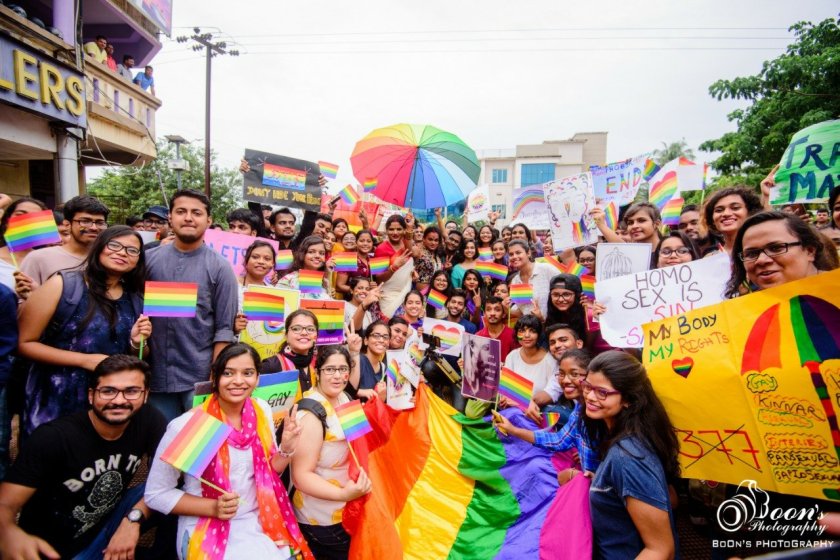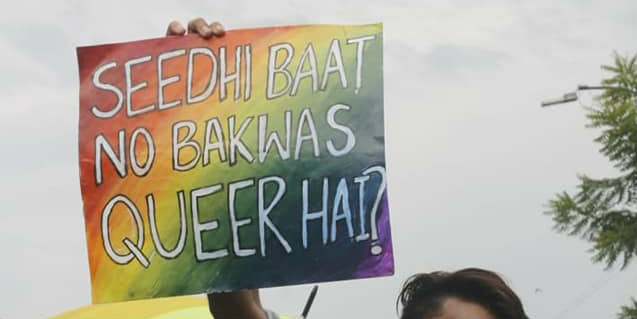“सिर्फ हंगामा खड़ा करना मेरा मक़्सद नहीं,
सारी कोशिश है कि ये सूरत बदलनी चाहिए।
मेरे सीने में नहीं तो तेरे सीने में सही,
हो कहीं भी आग, लेकिन आग जलनी चाहिए।“
Merely raising a ruckus is not my intention
I do this, for things must change
If not in my bosom, then in yours
Wherever it does, the fire must burn
~Dushyant Kumar
On September 1, 2018, hundreds of youngsters poured out of their houses and claimed the streets, voicing their support for LGBTQIA+ rights and asserting their identity. Gay, lesbian, bisexual, asexual, trans, intersex – all those individuals who aren’t supposed to exist in small town like Bhubaneswar and Cuttack – marched through the streets, draped in rainbow flags and capes. Standing together for the first time as a community, shedding the invisibility that has plagued them for years. As an organiser for Bhubaneswar’s first pride, I was overwhelmed to see my efforts turning into reality. While the celebration lasted for only three hours, the work for the same had been building up for a year.
When I resolved to work for LGBTQ+ rights in my town, the biggest challenge was forming a community for LGBTQ individuals themselves. Visibility was non-existent with most people closeted and completely invisible to the outside world. Too many people in Odisha suffer from mental health issues, bad marriages and stressful familial and professional relationships because coming out is not seen as a viable option.

A large crowd gathered for Bhubaneswar’s first pride. Credit: Bijaya Biswal
They are often isolated for the crime of being themselves, more prone to depression and sexual harassment, disowned by their families or discriminated at their workplaces. Too many spend years of their lives telling themselves that “it” is a “phase” that will pass, or a disease or something that needs meditation or medication. That’s why building a community is so important, it allows other to shed their isolation and meet others like themselves, to share their tragedies and triumphs with.
Community gives an individual the power of belonging, it creates a home. After months of discreet network-building to connect people with each other, we were finally able to create a collective for LGBTQ+ people in Bhubaneswar. Organising a pride event was the second goal, and, as it turned out, a much harder one.
The first obstacle was the societal shaming such an event would attract. So, tackling societal stigma became our primary priority, and so we made our pre-Pride events a mode for societal education. We planned out a month’s worth of discussion sessions on gender and sexuality in schools, film screenings, poetry and story-telling events, readings and open forum discussions to foster acceptance and tolerance within the queer community as well as those who identify as straight.
There was another unique challenge to organising such an event in a Tier II city: the majority do not find it necessary. People raise questions like, ‘Why do we need to talk about sexuality when we have poverty and unemployment to worry about?’ The answer from my side is simple, the straight community can talk about poverty and not sexuality, because the latter isn’t an impediment to their lives in any way. They can afford to not talk about sexuality, because they aren’t deprived of their rights. In the society we live in, heterosexuality is a form of privilege.

A poster at Bhubaneswar Pride. Credit: Bijaya Biswal
There are multiple layers of privilege that operate within the LGBTQIA+ community itself. For instance, being openly trans or being born intersex leads to immediate ostracisation and deprivation of educational and employment opportunities. At the same time, being cis and closeted comes with its own traumas and burdens. And thanks to some government programmes aimed at the trans community, if you’re trans in Odisha, you still have a community to turn to. But those who identify as LGBQ have no publicly open individuals or organisations to reach out to.
Bhubaneswar Pride was finally put together by The Parichay Collective, Meera Parida’s NGO, Sakha and SAATHII. The event’s focus was not just LGBTQIA rights but also intersectionality and inclusion. Odisha is not a state where the majority is upper class. We are made up of tribal communities, migrant workers and the displaced villagers from the places industrialists claim for themselves.
For a state like this, LGBTQIA movements have little meaning if they’re not intersectional. This Pride, we addressed the social constructs of “shame”, “untouchability”, class and caste bias, sex discrimination within and outside the community, and what it means to have the freedom to love whoever we want.
This Pride was just a stepping stone for our still-distant dream of equality in every aspect. But, with being Section 377 being read down today – it was an important, encouraging first step.
Bijaya Biswal is a 23-year-old MBBS student from Odisha.
Featured image credit: Bijaya Biswal

